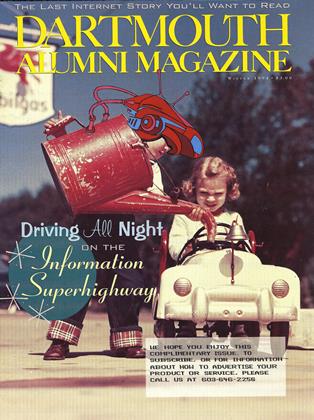By reading andreflecting throughouthis life, Trumanprepared himself forthe momentous.
I have made it a practice each fall, in speaking at Dartmouth convocations, to discuss the importance of heroes—men and women who, by the way they have lived their lives and by the impressive weight of their achievements, have been formative influences on our own personal, intellectual, and social development. This year I spoke about Ralph J. Bunche [see last month’s Presidential Range] and Harry S. Truman.
Born in 1884 in Independence, Missouri, Harry Truman never departed from the values of his midwestern, agrari- an youth or of the quieter century into which he was born; honesty and hard work, fair play and personal integrity. He did not attend college, but was throughout his lifetime a voracious reader, especially of histo- ry, from Plutarch to Macaulay. After completing high school, Truman worked as a bank clerk, a land and mining speculator, an agricultural laborer, and a farm manager. Although he could have avoided ser- vice in World War I because of poor eye- sight, he enlisted as captain of an artillery battery and saw fierce and bloody action in France. From that traumatic experience he discovered that he had a gift for leadership.
After the war, Truman opened a men’s clothing store in Kansas City. Within three years the busi- ness had failed, saddling him with debts that he insisted upon paying off in full, even though it took him nearly 20 years to do so.
Finally, at age 3 8, he entered politics—some have suggested out of desperation—and won election to the Jackson County Court; he was, in essence, a county com- missioner. He was elect- ed to the United States Senate in 1934 and re elected in 1940. His work as chairman of a special Senate committee investigating corruption and inefficiency in World War II military procurement was widely praised, and in 1944 he was chosen as Franklin Delano Roosevelt’s vice- presidential running mate. When Roosevelt died only 82 days after he had been sworn in for his fourth term, Harry S. Truman became the 33rd President of the United States.
The challenges that confronted him were Herculean, especially the problems of dealing with the Soviet Union and coping with the onset of the Cold War. Truman was not even told about the Manhattan Project until he had been President for 12 days; shortly thereafter, he alone had to decide whether to use the atomic bomb on Japan.
His achievements as President were formidable. In foreign affairs, Truman devised a policy of contain- ment toward the Soviet Union. He formulated the Truman Doctrine, implemented the Marshall Plan for rebuilding Western Europe, created the North American Treaty Organization, and sent American forces into battle in South Korea. He rec- ognized the State of Israel and committed the United States to the newly-born United Nations.
On the domestic front, Truman’s Fair Deal sought to continue the goals and aspirations of Roosevelt’s New Deal. Although his origins were in a border state where Jim Crow still prevailed, Truman knew from historical reflection and humane instinct that racial discrimi- nation was wrong. By executive order he desegregated the armed services and the civil service, and, at great cost to his political fortunes, he advocated the nation’s first mean- ingful civil rights program.
Through most of his nearly eight years in office, Truman was a pro- foundly unpopular president. He was regarded by many as incompetent and undignified. “To err is Truman,” observed Washington wits. Yet Truman never lost his sturdy opti- mism, jaunty self-confidence, or his unshakable conviction that his princi- ples were right. He accepted fully the responsibility proclaimed by the slo- gan he kept on his desk: The Buck Stops Here.
The reasons that Truman was able to rise to the challenge of the Presidency derive, surely, from his character. Throughout his life Truman remained open to experi- ence, finding in crises opportunities and converting adversity into a cru- cible of personal growth. Even amidst the pressures and cynicism of politics, Truman retained a straight- forward devotion to the bedrock val- ues of his youth when, as he said, “right was right and wrong was wrong, and you didn’t have to talk about it.”
What does the life of Harry Truman teach us? It teaches that a person who engages in a lifelong- pursuit of education, beyond the school and college years, can contin- ue to grow in understanding and moral stature. By reading and reflecting throughout his life, Truman gained a sympathetic understanding of history and human nature. More than that, he remained intellectually vital and prepared for the momentous opportunities that history eventually would place before him. “
 View Full Issue
View Full Issue
More From This Issue
-
 Cover Story
Cover StoryProcrastinator’s Night Confessions of a Collegiate Insomniac
Winter 1993 By Jane Hodges ’92 -
 Feature
FeatureBIG JUMP
Winter 1993 By David Bradley ’38 -
 Feature
FeatureAn Environmental B
Winter 1993 By Noel Perrin -
 Feature
FeatureMoriarty Ad Lib
Winter 1993 By Robert Sullivan ’75 -
 Article
ArticleDivers Notes & Observations
Winter 1993 By “E. Wheelock” -
 Article
ArticleThe City Peter Built
Winter 1993 By Karen Endicott
James O. Freedman
-
 Cover Story
Cover StoryThe President Makes His Case
FEBRUARY • 1988 By James O. Freedman -
 Article
ArticleTHE PROFESSOR'S LIFE
FEBRUARY 1991 By James O. Freedman -
 Article
ArticleA ROBUST INTELLECTUAL
APRIL 1991 By James O. Freedman -
 Article
ArticleThe Freedom That Binds
MAY 1992 By James O. Freedman -
 Article
ArticleA New Dartmouth Tradition
June 1993 By James O. Freedman -
 Article
ArticleWomen and Men of Dartmouth
OCTOBER 1997 By James O. Freedman








